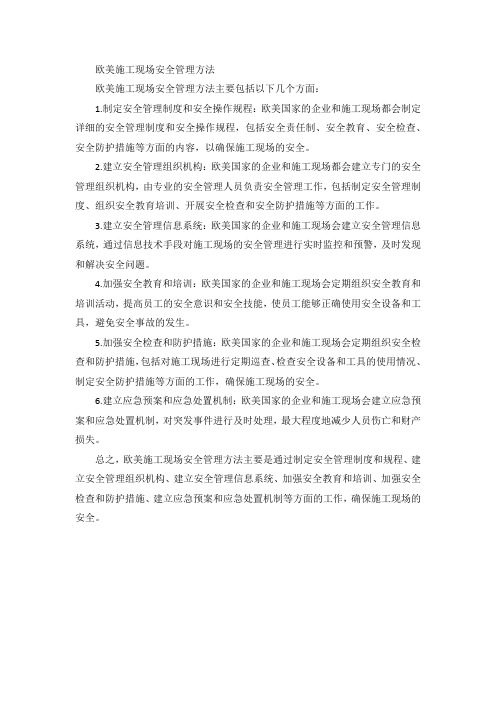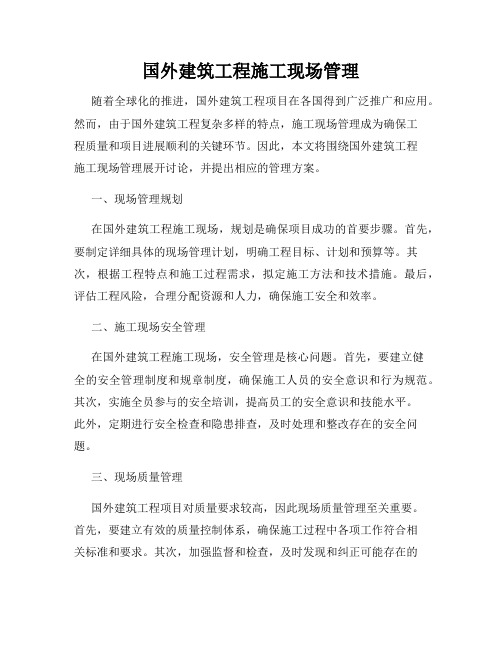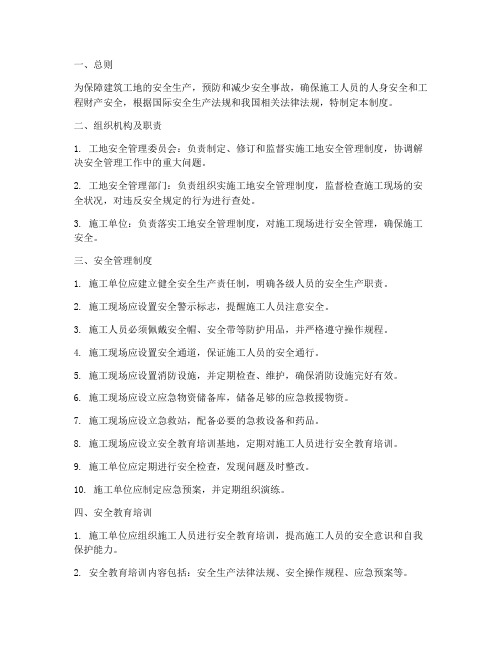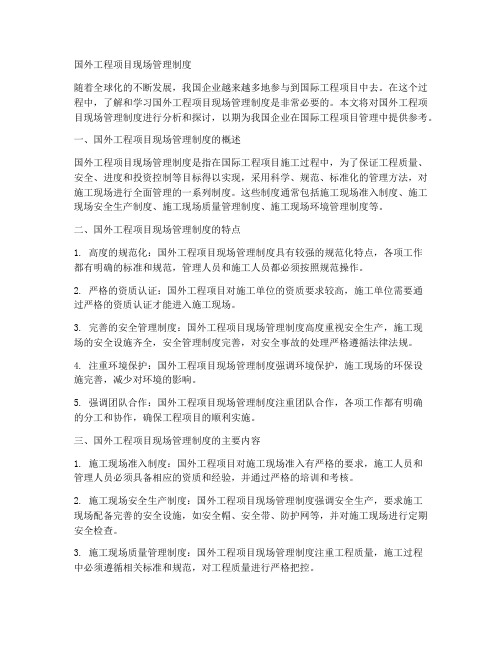国外工程现场管理规范性文件-现场安全管理Site-Security
欧美施工现场安全管理方法

欧美施工现场安全管理方法
欧美施工现场安全管理方法主要包括以下几个方面:
1.制定安全管理制度和安全操作规程:欧美国家的企业和施工现场都会制定详细的安全管理制度和安全操作规程,包括安全责任制、安全教育、安全检查、安全防护措施等方面的内容,以确保施工现场的安全。
2.建立安全管理组织机构:欧美国家的企业和施工现场都会建立专门的安全管理组织机构,由专业的安全管理人员负责安全管理工作,包括制定安全管理制度、组织安全教育培训、开展安全检查和安全防护措施等方面的工作。
3.建立安全管理信息系统:欧美国家的企业和施工现场会建立安全管理信息系统,通过信息技术手段对施工现场的安全管理进行实时监控和预警,及时发现和解决安全问题。
4.加强安全教育和培训:欧美国家的企业和施工现场会定期组织安全教育和培训活动,提高员工的安全意识和安全技能,使员工能够正确使用安全设备和工具,避免安全事故的发生。
5.加强安全检查和防护措施:欧美国家的企业和施工现场会定期组织安全检查和防护措施,包括对施工现场进行定期巡查、检查安全设备和工具的使用情况、制定安全防护措施等方面的工作,确保施工现场的安全。
6.建立应急预案和应急处置机制:欧美国家的企业和施工现场会建立应急预案和应急处置机制,对突发事件进行及时处理,最大程度地减少人员伤亡和财产损失。
总之,欧美施工现场安全管理方法主要是通过制定安全管理制度和规程、建立安全管理组织机构、建立安全管理信息系统、加强安全教育和培训、加强安全检查和防护措施、建立应急预案和应急处置机制等方面的工作,确保施工现场的安全。
国外工地安全管理制度

一、引言为了确保国外工地施工过程中员工的生命安全和身体健康,提高工程质量和施工效率,根据我国相关法律法规及国际惯例,特制定本安全管理制度。
二、组织机构与职责1. 成立工地安全管理委员会,负责制定、实施、监督和检查工地安全管理工作。
2. 工地项目经理为工地安全第一责任人,全面负责工地安全管理工作。
3. 各部门负责人对本部门的安全管理工作负直接责任。
4. 所有员工应严格遵守安全管理制度,积极参与安全管理活动。
三、安全管理制度1. 安全教育培训(1)新员工入职前,必须接受公司统一的安全教育培训,合格后方可上岗。
(2)定期组织安全知识培训,提高员工安全意识和操作技能。
2. 安全设施与设备(1)施工现场必须配备必要的安全设施和设备,如安全帽、安全带、防护眼镜、防尘口罩等。
(2)对安全设施和设备进行定期检查、维护,确保其正常运行。
3. 施工现场安全管理(1)施工现场应设立明显的安全警示标志,明确危险区域和操作规程。
(2)施工现场应保持整洁,材料堆放整齐,通道畅通。
(3)施工现场严禁酒后作业、疲劳作业、带病作业。
4. 高处作业安全(1)高处作业人员必须佩戴安全带,并正确使用。
(2)高处作业前,必须对作业区域进行安全检查,确保无安全隐患。
(3)高处作业时,严禁抛掷工具、材料等。
5. 机械设备安全(1)机械设备操作人员必须经过专业培训,取得操作资格。
(2)机械设备操作前,必须进行安全检查,确保设备正常运行。
(3)机械设备操作过程中,严禁违规操作、违章作业。
6. 起重吊装安全(1)起重吊装作业必须由专业人员进行,并严格按照操作规程进行。
(2)起重吊装作业前,必须对吊装设备、吊装区域进行安全检查。
(3)起重吊装作业时,严禁超载、超范围作业。
7. 火灾预防与应急处理(1)施工现场应配备足够的消防器材,并定期检查、维护。
(2)严禁施工现场吸烟、使用明火。
(3)发生火灾时,立即启动应急预案,组织人员疏散,确保人员安全。
四、奖惩措施1. 对严格遵守安全管理制度、积极提出安全建议的员工给予奖励。
国外建筑工程施工现场管理

国外建筑工程施工现场管理随着全球化的推进,国外建筑工程项目在各国得到广泛推广和应用。
然而,由于国外建筑工程复杂多样的特点,施工现场管理成为确保工程质量和项目进展顺利的关键环节。
因此,本文将围绕国外建筑工程施工现场管理展开讨论,并提出相应的管理方案。
一、现场管理规划在国外建筑工程施工现场,规划是确保项目成功的首要步骤。
首先,要制定详细具体的现场管理计划,明确工程目标、计划和预算等。
其次,根据工程特点和施工过程需求,拟定施工方法和技术措施。
最后,评估工程风险,合理分配资源和人力,确保施工安全和效率。
二、施工现场安全管理在国外建筑工程施工现场,安全管理是核心问题。
首先,要建立健全的安全管理制度和规章制度,确保施工人员的安全意识和行为规范。
其次,实施全员参与的安全培训,提高员工的安全意识和技能水平。
此外,定期进行安全检查和隐患排查,及时处理和整改存在的安全问题。
三、现场质量管理国外建筑工程项目对质量要求较高,因此现场质量管理至关重要。
首先,要建立有效的质量控制体系,确保施工过程中各项工作符合相关标准和要求。
其次,加强监督和检查,及时发现和纠正可能存在的质量问题。
此外,注重施工过程中的质量记录和档案管理,为验收和结算提供有效依据。
四、进度和成本控制国外建筑工程项目通常有严格的工期和预算要求,因此进度和成本控制至关重要。
首先,制定详细的工期计划和进度安排,合理分配资源和人力。
其次,建立成本控制体系,精确估算和监控工程成本。
此外,实施定期的进度和成本报告,及时掌握项目进展情况和盈亏情况,为项目管理提供决策参考。
五、人力资源管理国外建筑工程项目常常涉及不同国家和文化背景的团队协作,因此人力资源管理显得尤为重要。
首先,建立团队协作的机制和沟通渠道,促进各方有效合作。
其次,注重人员培训和激励,提高员工的专业素质和工作积极性。
此外,合理分工和任务分配,确保团队各成员的工作高效完成。
六、环境保护管理在国外建筑工程施工现场,环境保护管理是社会责任和可持续发展的要求。
国外_施工_安全管理制度

随着我国经济的快速发展,对外经济合作日益频繁,我国企业在国际工程承包市场中扮演着越来越重要的角色。
为保障我国海外工程项目的顺利进行,确保施工人员生命财产安全,提高工程质量和效率,特制定本国外施工安全管理制度。
二、指导思想坚持以人为本,预防为主,综合治理的方针,强化安全生产责任,确保施工过程中不发生安全事故。
三、组织机构及职责1. 项目部成立安全生产领导小组,负责项目安全生产工作的全面领导和管理。
2. 项目经理为安全生产第一责任人,负责组织、协调、监督安全生产工作的落实。
3. 安全生产部负责安全生产的具体实施,包括安全检查、隐患排查、事故调查处理等。
4. 各部门负责人为部门安全生产第一责任人,负责本部门安全生产工作的组织实施。
四、安全管理制度1. 施工前准备(1)对施工人员进行安全教育和培训,确保其掌握安全知识和技能。
(2)对施工现场进行安全检查,消除安全隐患。
(3)制定施工组织设计和施工方案,明确安全生产要求。
2. 施工过程管理(1)严格执行安全生产操作规程,确保施工过程安全。
(2)加强对施工机械、设备、材料的检查和维护,确保其安全可靠。
(3)对施工现场进行不定期的安全检查,及时发现和消除安全隐患。
(4)对施工人员进行定期安全教育和培训,提高其安全意识。
3. 隐患排查治理(1)建立健全隐患排查治理制度,明确隐患排查治理的责任人。
(2)定期对施工现场进行隐患排查,及时发现和消除安全隐患。
(3)对排查出的隐患,按照“五定”原则进行整改,确保整改到位。
4. 事故报告及处理(1)发生安全事故时,立即启动应急预案,采取措施控制事故扩大。
(2)及时报告上级部门,并按照规定进行事故调查处理。
(3)对事故原因进行分析,总结教训,制定整改措施,防止类似事故再次发生。
5. 安全生产考核(1)将安全生产纳入绩效考核,对安全生产成绩突出的单位和个人给予奖励。
(2)对安全生产责任不落实、发生安全事故的单位和个人进行严肃处理。
外国建筑工地安全管理制度

一、总则为保障建筑工地的安全生产,预防和减少安全事故,确保施工人员的人身安全和工程财产安全,根据国际安全生产法规和我国相关法律法规,特制定本制度。
二、组织机构及职责1. 工地安全管理委员会:负责制定、修订和监督实施工地安全管理制度,协调解决安全管理工作中的重大问题。
2. 工地安全管理部门:负责组织实施工地安全管理制度,监督检查施工现场的安全状况,对违反安全规定的行为进行查处。
3. 施工单位:负责落实工地安全管理制度,对施工现场进行安全管理,确保施工安全。
三、安全管理制度1. 施工单位应建立健全安全生产责任制,明确各级人员的安全生产职责。
2. 施工现场应设置安全警示标志,提醒施工人员注意安全。
3. 施工人员必须佩戴安全帽、安全带等防护用品,并严格遵守操作规程。
4. 施工现场应设置安全通道,保证施工人员的安全通行。
5. 施工现场应设置消防设施,并定期检查、维护,确保消防设施完好有效。
6. 施工现场应设立应急物资储备库,储备足够的应急救援物资。
7. 施工现场应设立急救站,配备必要的急救设备和药品。
8. 施工现场应设立安全教育培训基地,定期对施工人员进行安全教育培训。
9. 施工单位应定期进行安全检查,发现问题及时整改。
10. 施工单位应制定应急预案,并定期组织演练。
四、安全教育培训1. 施工单位应组织施工人员进行安全教育培训,提高施工人员的安全意识和自我保护能力。
2. 安全教育培训内容包括:安全生产法律法规、安全操作规程、应急预案等。
3. 施工人员必须参加安全教育培训,并取得合格证书。
五、事故处理1. 发生安全事故后,施工单位应立即启动应急预案,组织救援。
2. 施工单位应及时向相关部门报告事故情况,并配合事故调查。
3. 对事故责任人和责任单位进行严肃处理,追究其法律责任。
4. 对因事故造成的人员伤亡和财产损失,施工单位应依法赔偿。
六、附则1. 本制度自发布之日起施行。
2. 本制度由工地安全管理委员会负责解释。
国外现场安全管理制度

一、前言为确保现场施工安全,保障员工生命财产安全,提高施工质量,我国某大型建筑企业特制定以下现场安全管理制度。
二、组织机构及职责1. 成立现场安全管理领导小组,负责现场安全管理工作。
2. 安全管理领导小组下设安全管理部门,负责现场安全管理工作。
3. 各项目部成立安全工作领导小组,负责本项目的安全管理工作。
4. 各部门、班组设立兼职安全员,负责本部门、班组的安全管理工作。
三、现场安全管理制度1. 安全教育(1)新员工入职前,必须进行岗前安全培训,考核合格后方可上岗。
(2)定期对员工进行安全教育培训,提高员工安全意识。
(3)组织安全知识竞赛、安全演讲等活动,增强员工安全意识。
2. 安全检查(1)每日进行现场安全检查,发现问题及时整改。
(2)每周进行一次全面安全检查,对安全隐患进行排查。
(3)节假日、雨雪天气等特殊时期,加大安全检查力度。
3. 安全防护措施(1)施工现场必须设置安全警示标志,明确安全警示内容。
(2)高处作业、起重作业等危险作业,必须配备安全防护设施。
(3)施工现场道路、通道、出口等必须保持畅通,不得堆放杂物。
4. 事故处理(1)发生安全事故,立即启动应急预案,组织救援。
(2)对事故原因进行调查分析,查明事故原因,采取有效措施防止类似事故再次发生。
(3)对事故责任人和相关责任人进行追责。
5. 责任追究(1)对违反现场安全管理制度的行为,依法进行处罚。
(2)对因安全管理不到位导致安全事故的,追究相关责任人的责任。
(3)对安全事故隐瞒不报、谎报的,依法严肃处理。
四、附则1. 本制度自发布之日起施行。
2. 本制度由安全管理部门负责解释。
3. 本制度如与国家有关法律法规相抵触,以国家法律法规为准。
通过以上现场安全管理制度,我国某大型建筑企业将加强现场安全管理,确保施工安全,为我国建筑事业的发展贡献力量。
国外工程项目现场管理制度

国外工程项目现场管理制度随着全球化的不断发展,我国企业越来越多地参与到国际工程项目中去。
在这个过程中,了解和学习国外工程项目现场管理制度是非常必要的。
本文将对国外工程项目现场管理制度进行分析和探讨,以期为我国企业在国际工程项目管理中提供参考。
一、国外工程项目现场管理制度的概述国外工程项目现场管理制度是指在国际工程项目施工过程中,为了保证工程质量、安全、进度和投资控制等目标得以实现,采用科学、规范、标准化的管理方法,对施工现场进行全面管理的一系列制度。
这些制度通常包括施工现场准入制度、施工现场安全生产制度、施工现场质量管理制度、施工现场环境管理制度等。
二、国外工程项目现场管理制度的特点1. 高度的规范化:国外工程项目现场管理制度具有较强的规范化特点,各项工作都有明确的标准和规范,管理人员和施工人员都必须按照规范操作。
2. 严格的资质认证:国外工程项目对施工单位的资质要求较高,施工单位需要通过严格的资质认证才能进入施工现场。
3. 完善的安全管理制度:国外工程项目现场管理制度高度重视安全生产,施工现场的安全设施齐全,安全管理制度完善,对安全事故的处理严格遵循法律法规。
4. 注重环境保护:国外工程项目现场管理制度强调环境保护,施工现场的环保设施完善,减少对环境的影响。
5. 强调团队合作:国外工程项目现场管理制度注重团队合作,各项工作都有明确的分工和协作,确保工程项目的顺利实施。
三、国外工程项目现场管理制度的主要内容1. 施工现场准入制度:国外工程项目对施工现场准入有严格的要求,施工人员和管理人员必须具备相应的资质和经验,并通过严格的培训和考核。
2. 施工现场安全生产制度:国外工程项目现场管理制度强调安全生产,要求施工现场配备完善的安全设施,如安全帽、安全带、防护网等,并对施工现场进行定期安全检查。
3. 施工现场质量管理制度:国外工程项目现场管理制度注重工程质量,施工过程中必须遵循相关标准和规范,对工程质量进行严格把控。
国外项目的安全管理制度

一、总则为保障国外项目施工安全,预防事故发生,提高员工安全意识,确保项目顺利进行,特制定本安全管理制度。
二、安全组织机构1. 成立项目安全领导小组,由项目经理担任组长,负责项目的全面安全管理。
2. 项目安全领导小组下设安全办公室,负责日常安全管理工作。
3. 各部门、各工种均应设立安全员,负责本部门、本工种的安全管理工作。
三、安全管理制度1. 安全教育(1)项目进场前,对所有员工进行安全教育培训,包括安全知识、操作规程、应急处理等内容。
(2)定期组织安全知识培训,提高员工安全意识。
(3)对特殊工种进行专项培训,确保其具备相应安全技能。
2. 安全检查(1)项目安全领导小组每月至少组织一次全面安全检查,对施工现场、机械设备、消防设施等进行检查。
(2)各部门、各工种每周至少进行一次自查,确保安全生产。
(3)发现安全隐患,立即整改,确保整改措施落实到位。
3. 安全防护用品(1)员工必须正确佩戴安全帽、安全带、防护眼镜等安全防护用品。
(2)特殊工种需佩戴相应的防护用品,如防尘口罩、防毒面具等。
4. 机械设备管理(1)机械设备必须符合国家安全标准,定期进行维护保养。
(2)操作人员必须经过培训,取得相应资格证书后,方可操作机械设备。
5. 施工现场管理(1)施工现场应设置明显的安全警示标志,提醒员工注意安全。
(2)施工现场应保持整洁,不得乱堆乱放材料、工具等。
(3)施工现场应设置安全通道,确保人员疏散畅通。
6. 消防安全管理(1)施工现场应配备足够的消防设施,并定期检查、维护。
(2)员工应掌握消防器材的使用方法,学会火灾应急处理。
(3)施工现场严禁吸烟,禁止使用明火。
四、事故处理1. 事故报告(1)发生安全事故,立即向项目安全领导小组报告。
(2)报告内容包括事故时间、地点、原因、人员伤亡情况等。
2. 事故调查(1)项目安全领导小组组织事故调查,查明事故原因。
(2)根据事故原因,提出整改措施,防止类似事故再次发生。
- 1、下载文档前请自行甄别文档内容的完整性,平台不提供额外的编辑、内容补充、找答案等附加服务。
- 2、"仅部分预览"的文档,不可在线预览部分如存在完整性等问题,可反馈申请退款(可完整预览的文档不适用该条件!)。
- 3、如文档侵犯您的权益,请联系客服反馈,我们会尽快为您处理(人工客服工作时间:9:00-18:30)。
Site SecurityTable of Contents1.Introduction2.Responsibility3.Site Security4.Site Security Plan1. IntroductionProper site security arrangements are necessary to protect Company's and client's property. Security very much relates to safety and has a degree of overlap with safety.On construction projects within the fence of an existing plant, usually the client's security and guard arrangements will be applicable also to the construction of the new facilities.However, security relative to Company's site buildings and the documentation contained there-in on any project requires proper attention and measures.This section is to be considered a guide to setting up a security program for construction projects where there are no existing facilities and, thus, own all encompassing security arrangements have to be made by Company.2. ResponsibilityAs for safety, the ultimate responsibility for security on site rests with the Project Construction Manager.The organizational structure of the Company site team, project size and client's requirements/involvement relative to security will determine who in the site organization will handle the day to day security matters. Generally, the Company Safety Manager will have functional responsibility with the administrative responsibility resting with the Office Manager. Alternatively the Office Manager may handle all security matters.3. Site Security3.1 Guard ServiceAt the start of site activities arrangements have to be made for guard services at the site gate. Guard services can be obtained either by means of a subcontract to a specialized security firm or by hiring personnel locally on Company's payroll. Using a specialized firm usually has preference over hiring own personnel for a number of reasons e.g. experienced personnel can be expected, replacements during vacations and illnesses can be obtained, standard guard/security instructions will be available. Moreover the specialized firm processes all necessary permits/licences and registrations (to be checked!) as maybe required by authorities. When making arrangements for guard services consider:•Facilities required e.g guardhouse, movable gate/boom, communications (telephone/portophone) etc.•Hours of service i.e. day-service, night-service, 24-hours coverage, week-ends.•Patrols, punchclocks, dogs, etc.3.1.1 Guard DutiesThe duties of the guard(s) usually consist of the following (subject to local or project circumstances specific other duties may be assigned):•Control of incoming and outgoing personnel, visitors and traffic and maintaining the necessary administration and records related thereto.•Control of incoming and outgoing materials, tools, construction equipment, office furniture and equipment and any other materials or consumables, regardless of ownership.•Control of firehazards in the working areas as well as in/around offices and shops, after working house.•Control of security relative to Company's, client's and subcontractors' offices, after working hours, with respect to "clean disk"discipline and the lock-up of desks, filing cabinets and cupboards containing project information and documentation.3.2 Security Rules and InstructionsAs already said, security has a degree of overlap with safety. The following security rules and instructions shall therefore be read in conjunction with the Company Safety Manual, procedure CO-SP-501 "Field Construction Safety Program".3.2.1 Security RulesSpecifically prohibited on the site, as related to security, are:•Bringing and/or carrying of any weapons.•Bringing animals (except guard/patrol dogs).•Selling or the possession of alcoholic beverages or drugs.•Selling, advertisement and distribution of newspapers, illustrated papers, leaflets, tapes, gadgets or promotional campaigns of a political, religious, moral, sexual or subversive nature.•Bringing photo and film cameras and audio and video equipment without Company's prior approval.•Making or repairing of items for private use/purposes.3.2.2 Security InstructionsThe following are standard security instructions for any project which maybe complemented as required by specific project needs: •Security guards will be instructed by Company/client only. They shall have orders to take instructions from no one else.•All incoming and outgoing personnel, visitors and traffic shall be controlled in accordance with job specific security instruc-tions.•Visitors will be registered as such and receive a visitors pass. The guard at the gate shall warn the person to be visited before granting the visitor entrance to the site. Identification of visitors shall be in accordance with job specific securityinstructions.•Erection of sign board on as well as off site requires the prior approval from Company and local authorities as required.•All personnel working at the site shall be property identified and be in the possession of an identification card of badge. Type of identification shall be determined in the job safety/security plan. Such identification card/badge shall be returned toCompany upon termination of employment on the site.•The guard's authority includes the right to search any person or vehicle before entry or exit and to refuse site entrance to any person not meeting security requirements.•Trucks with incoming materials will be checked at the gate and the guard will direct them along the proper roads to the Company warehouse or unloading destination, after consultation with the Company Warehouse Supervisor.•All materials, tools and equipment leaving the site require a Company Outshipment Report signed by an authorized person.This also applies to personal tools.•As required, job specific security instruction shall prescribe the guards to make rounds after working hours to control particularly:•clean desk and lock-up discipline•open doors and windows•switched on office equipment•firehazards•lighting switched on or off as required•After normal working hours, the guard shall always be informed as to numbers and names of personnel working overtime and the name of the responsible supervisor(s).•Modifying, cutting or removing site fencing may only be performed with the written approval from Company.•On a regular basis Company's and Client's Safety/Security Officers shall conduct, after office hours, checks in cooperation with the Subcontractor's security representative.3.3 Security of Information and Documentation•The Client may have his own procedure on protection of his proprietary information. In such cases Company should strictly adhere to the Client's procedure. Keep in mind that in the conduct of its business, Company is the custodian of confidential information of many Clients as well as its own, and possesses a substantial amount of proprietary information.•All confidential information given to, or acquired by subcontractors and their employees relating to the business of Company and Client must be maintained in strict confidence. Every reasonable effort must be made by all concerned to prevent anyunauthorized disclosure or use of such information.•It is vital to our business and in the interest of the Client that the confidentiality of such information be preserved.•Specific guidelines:•After office hours, all Company and Client's proprietary information shall be secured in steel filing cabinets equipped with cylinder-type security locks.•During lunch hours, all access doors to the offices in which proprietary information is maintained be locked when unattended.•Company and Client's proprietary documents shall be destroyed either by shredding or a chemical process. Supervision by Company's Safety/Security Officer is recommended whenever documents are destroyed.•Duplication of Company's or Client's proprietary information is only permitted with the written approval of the originator.•Distribution of proprietary data is on a "need-to-know" basis only.4. Site Security Plan•Prior to the start of field activities a site security plan as part of the site safety plan must be developed.•The following is an indicative listing of items that should be considered, and addressed as required, in the development of the security plan:•Meeting with client to discuss security and establish requirements.•Perimeter fencing arrangements.•Number, location and type of entrance gates and parking areas.•Establishment of a guard service and determination of coverage (day, night, week-ends, etc.).•Security documentations:•Guard instructions and duties•Gate passes (visitors, cars, etc.)•Guard registers and logbooks•Security communication facilities.•Identification card or badge system and personnel registration requirements.•Guard patrol and punchclock requirements.•Lines of authority and communication relative to security.•Local authorities (addresses, telephone numbers, etc.) in conjunction with safety arrangements.•Evacuation procedure (as related to security).。
